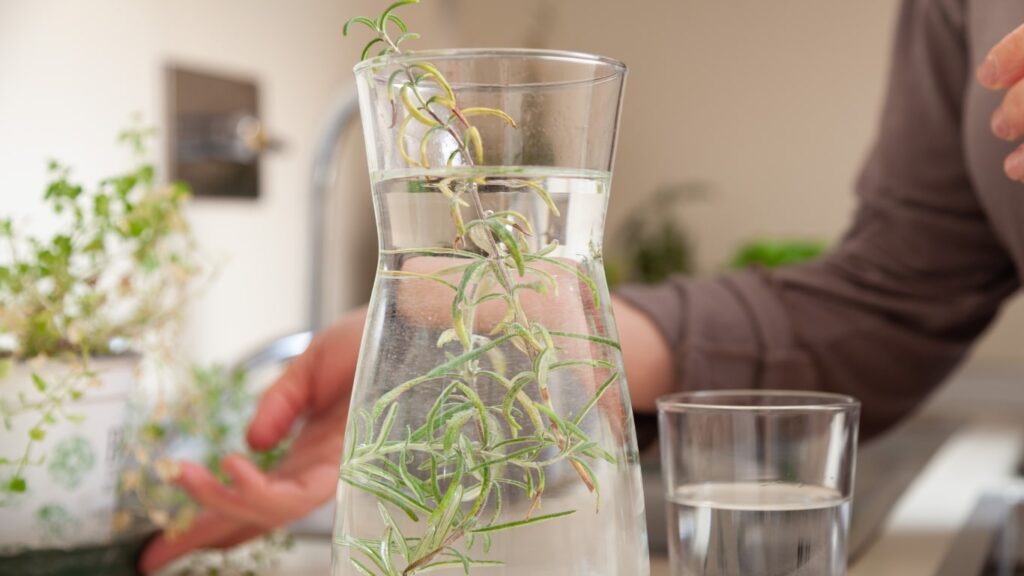
Introduction
Rosemary (Rosmarinus officinalis) is a fragrant evergreen herb native to the Mediterranean region, widely used in cooking, cosmetics, and traditional medicine. One of the lesser-known but increasingly popular uses of rosemary is in the form of rosemary water. This simple yet potent herbal infusion offers a variety of benefits, making it a versatile addition to both health and beauty routines. In this article, we will explore what rosemary water is, how it can be used, and the science-backed benefits that make it a valuable remedy.
What is Rosemary Water?
Rosemary water is essentially an infusion made by steeping rosemary leaves in water. The process extracts the essential oils and beneficial compounds from the leaves, creating a liquid that can be used topically or ingested. Rosemary water is known for its distinctive herbal scent, which is both invigorating and soothing. It is easy to prepare at home and can be used in various ways, depending on your needs.
How do you make rosemary water?
Making rosemary water at home is simple and requires just a few ingredients:
- Fresh or dried rosemary leaves
- Water
- A pot and a strainer
Instructions:
- Boil about two cups of water in a pot.
- Add a handful of fresh rosemary leaves (or two tablespoons of dried rosemary) to the boiling water.
- Reduce the heat and let it simmer for about 15–20 minutes.
- Remove the pot from the heat and allow the mixture to cool.
- Strain the liquid to remove the leaves and transfer the rosemary water into a clean container.
This basic rosemary water can be stored in the refrigerator for up to a week and used as needed.
The Nutritional Profile of Rosemary
Rosemary is rich in a variety of nutrients that contribute to its health benefits. It contains antioxidants, such as rosmarinic acid, carnosic acid, and caffeic acid, which are known for their anti-inflammatory and antimicrobial properties. Rosemary also provides essential vitamins and minerals, including vitamin A, vitamin C, calcium, and iron.
Health Benefits of Rosemary Water
1. Hair Health with Rosemary Water
One of the most popular uses of rosemary water is for hair care. Rosemary has been traditionally used to promote hair growth, reduce dandruff, and improve scalp health. The active compounds in rosemary, particularly carnosic acid, help to stimulate blood circulation in the scalp, which in turn encourages hair growth. Regular use of rosemary water as a rinse or scalp treatment can result in thicker, healthier hair.
How to Use:
- After shampooing, pour rosemary water over your hair as a final rinse. Leave it in for a few minutes before rinsing with cool water.
- Alternatively, you can massage rosemary water directly into the scalp and leave it on for 15–20 minutes before washing your hair.
2. Rosemary Water for Skin Care

Rosemary water is also beneficial for the skin due to its antioxidant and anti-inflammatory properties. It can help to reduce redness, irritation, and acne. The antimicrobial effects of rosemary make it an excellent natural toner, helping to cleanse the skin and tighten pores.
How to Use:
- Use rosemary water as a facial toner by applying it with a cotton pad after cleansing.
- For a soothing facial mist, transfer rosemary water into a spray bottle and spritz it onto your face throughout the day.
3. Rosemary Water Effects on Cognitive Function and Mental Clarity
The aroma of rosemary has been linked to enhanced cognitive function and mental clarity. Studies have shown that inhaling rosemary can improve memory retention and concentration. This effect is attributed to the compounds 1,8-cineole and camphor, which are present in rosemary’s essential oil.
How to Use:
- Inhale the scent of rosemary water directly from the bottle or add it to a diffuser to fill the room with its fragrance.
- Drinking rosemary water or adding it to teas can also provide a mild cognitive boost.
4. Digestive Health with Rosemary Water
Rosemary has traditionally been used to alleviate digestive issues such as bloating, gas, and indigestion. The herb’s carminative properties help to relax the muscles of the gastrointestinal tract, making it easier to pass gas and reduce discomfort. Rosemary water can be a gentle remedy for these common digestive complaints.
How to Use:
- Sip on rosemary water before or after meals to aid digestion.
- Combine rosemary water with other digestive herbs like peppermint or ginger for an enhanced effect.
5. Anti-Inflammatory and Pain Relief Using Rosemary Water
The anti-inflammatory properties of rosemary can also be beneficial in reducing pain and inflammation in the body. Rosemary water can be used as a topical treatment for sore muscles, joint pain, and headaches.
How to Use:
- Apply rosemary water to the affected area using a cloth or cotton pad.
- For headaches, gently massage the temples with rosemary water or use it as a cold compress.
6. Rosemary Water on Immune System Support
Rosemary is rich in antioxidants that help to protect the body from oxidative stress and support the immune system. Regular consumption of rosemary water can boost the body’s defenses against infections and illnesses.
How to Use:
- Drink rosemary water regularly as part of your daily routine.
- Combine rosemary water with other immune-boosting herbs like echinacea or elderberry for added benefits.
7. Oral Health with Rosemary Water
Rosemary’s antimicrobial properties make it an effective natural mouthwash. It can help to freshen breath, reduce plaque buildup, and combat oral infections.
How to Use:
- Swish rosemary water in your mouth for 30 seconds to a minute, then spit it out.
- For an enhanced effect, add a few drops of rosemary essential oil to the water before use.
Potential Side Effects and Precautions Using Rosemary Water
While rosemary water is generally safe for most people, there are some precautions to keep in mind:
- Allergic Reactions: Some individuals may be allergic to rosemary. It’s advisable to do a patch test before using rosemary water topically.
- Pregnancy: Pregnant women should consult with a healthcare provider before using rosemary, especially in medicinal amounts, as it may have uterotonic effects.
- Epilepsy: Rosemary contains camphor, which can trigger seizures in individuals with epilepsy. Those with this condition should avoid high concentrations of rosemary.
Frequently Asked Questions
Can I spray rosemary water on my hair every day?
Yes, you can spray rosemary water on your hair every day. Daily use of rosemary water is generally safe and can help promote hair growth, improve scalp health, and reduce dandruff. It is particularly beneficial as a natural hair tonic, helping to nourish the hair follicles and keep the scalp hydrated. However, it’s important to monitor how your scalp and hair respond to ensure it doesn’t cause any dryness or irritation.
Why is my hair falling out after using rosemary water?
If your hair is falling out after using rosemary water, it could be due to an allergic reaction or irritation of the scalp. While rosemary is generally beneficial for hair health, some individuals may experience sensitivity to its compounds, leading to adverse effects like hair shedding or scalp irritation. It’s advisable to discontinue use immediately and consult with a dermatologist if you experience increased hair loss after using rosemary water.
Is rosemary water good for the face?
Yes, rosemary water is good for the face, especially for those with oily or acne-prone skin. Rosemary has antioxidant and anti-inflammatory properties that help reduce redness, fight acne-causing bacteria, and improve skin tone. It can be used as a facial toner or mist to tighten pores, refresh the skin, and provide a natural glow. However, those with sensitive skin should do a patch test before using it regularly to avoid potential irritation.
Conclusion
Rosemary water is a versatile and natural remedy with a wide range of applications for health and wellness. From promoting hair growth and skin health to enhancing cognitive function and supporting digestion, rosemary water offers numerous benefits supported by both tradition and modern science. Whether used as a topical treatment, a beverage, or an aromatic aid, rosemary water is a simple yet powerful addition to any holistic health regimen.
Incorporating rosemary water into your daily routine can provide long-lasting benefits for both body and mind. With its ease of preparation and multiple uses, this herbal infusion is a must-try for those looking to embrace natural remedies and enhance their overall well-being.
